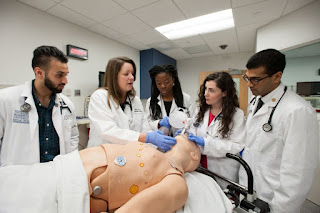A crash course on becoming a doctor
One of the biggest risks that not a lot of people are talking during this pandemic about is the fact that the medical front line workers are getting sick as well. The main danger of overloading healthcare facilities with COVID-19 patients is putting the lives of healthcare practitioners at risk. And if a physician has to stay at home to recover for several weeks, there would be less staff to take care of the ill. Dr. Matt Boente, M.D., notes that unlike the army that can send out battalion after battalion of soldiers each year, becoming a doctor takes a lot more time and effort. This is why losing doctors to COVID-19 is the last thing the society needs in this pandemic.
 |
Image source:
fiercehealthcare.com |
First, the aspiring healthcare practitioner must finish a degree in college. They should take at least the core minimum in subjects like biology, chemistry, or even nursing to give them a competitive edge. English and economics majors are not unusual to see in a med school but they have all taken the core pre-med courses including biology, physics, inorganic and organic chemistry, and calculus. Next, they have to score well on the MCAT to be eligible to enroll at a medical school. Once that hurdle is done they then have to take four more years in medical school. They must also finish 3 – 10 years of medical residence after graduating from medical school. And lastly, they have to take another exam to earn their medical license as well as yearly certification exams for board certification.
While these steps are what should be taken to become a physician, healthcare practitioners often branch off into specialties, where they receive further training. Dr. Matt Boente, M.D., explains that the road to becoming a licensed doctor is a 10-15-year quest to gain life-saving knowledge and experience. Dr. Boente spent 7 years in residency and fellowship to becaome a gynecologic oncologist.
Dr. Matt Boente, M.D., has a passion for the multiple facets of medicine. For similar reads, visit this page.
Dr. Matt Boente, M.D., has a passion for the multiple facets of medicine. For similar reads, visit this page.



Comments
Post a Comment